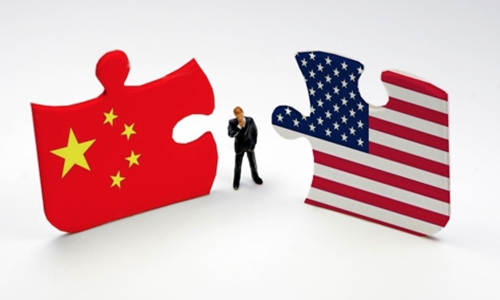HOME >> CHINA
Chinese journalist group slams US for suppression, discrimination
Source:Global Times Published: 2020/3/12 23:51:05

Photo: VCG
The All-China Journalists Association on Thursday strongly condemned the US for its unwarranted suppression and discriminatory practices against Chinese journalists in the country, slamming US double standards on "freedom of the press" and its hegemonic bullying.This is the second time in a week that the association has spoken out for the legitimate rights and interests of Chinese journalists overseas following Washington's latest decision to cap Chinese media employee numbers in the US.
The association said in recent years that US suppression of Chinese media has been intensifying. In December 2018, the US Department of Justice registered China Global Television Network's North America station as a "foreign agent." On February 18 this year, the US State Department announced that five Chinese media agencies in the US, including the Xinhua News Agency, would be designated as "foreign missions" and required to submit information on their staff and real estate. On March 2, the US State Department announced that starting March 13, the number of Chinese employees in the US from the five Chinese media would be cut by 60, or 40 percent, a move interpreted as expelling Chinese journalists from the US.
The association also criticized discriminatory US policies on visas for Chinese journalists.
The US only allows Chinese journalists stationed in the US to enter the country once. Chinese journalists who return home or go to a third country need to apply for a new visa when they enter the US again, while the US grants multiple-entry visas to journalists from other countries and regions.
Since 2018, the US has been making it difficult for Chinese journalists to apply for visas. It has arbitrarily added more application materials that Chinese journalists are required to submit. In addition to the normal application materials, it also requires Chinese journalists to submit a large amount of additional materials, such as social media accounts, exit records over the past 15 years, company registration information and organizational structure in the US, and social relations.
The US also extended its visa approval time, delaying visa approvals indefinitely or even refusing visa applications, claiming administrative review. Statistics show that since 2018, the visas of more than 30 Chinese journalists have been delayed indefinitely or have even been refused by the US. Among them, nine resident journalists have been unable to re-enter the US after leaving. Some Chinese journalists have not received any feedback from the US and their passports have not been returned since they applied for visas in mid-December.
The association also condemned the US for restricting Chinese journalists from reporting in the US for a variety of reasons. On the grounds that their agencies were "foreign agents," the US denied journalists from CGTN, China Daily (which was registered in 1983) and other media outlets the right to apply for US Congress press credentials. The US also demanded that some Chinese journalists regularly submit employment certificates to the White House. Chinese reporters were often "looked at differently" or even interrogated during reporting.
The US has removed some Chinese journalists from its email invitation list for small-scale events, or excluded them from coverage of small-scale events on the grounds that the number has been reached. It has become increasingly difficult to conduct interviews for Chinese reporters in the US after their agencies were listed as "foreign agents."
Calling these actions "political oppression driven by its Cold War mentality and ideological bias," the association said they have seriously violated the normal and legitimate rights and interests of Chinese journalists overseas, seriously damaged the reputation of Chinese media, and seriously interfered with their normal operations.
"We urged the US to effectively correct the wrong practices that violate the legitimate rights and interests of Chinese journalists in the US and take action to ensure their normal operations," the statement said.
Chinese experts have said that the latest US move serves as "retaliation" for China revoking the press credentials of three Wall Street Journal journalists over a racist headline, and also as one of its cards to contain China.
Da Wei, director of the Center for Strategic and International Security Studies at the University of International Relations, said no matter how the US chooses to designate them, these journalists help the two countries better understand each other. There have been challenges in China-US relations, and the two countries should try to increase mutual understanding rather than closing their doors to one another and creating further misjudgments.
The US' move this time can be seen as a step that further leads to China-US decoupling. Such incidents will accumulate and eventually lead to a complete decoupling. The US is accelerating this trend, Da said.
It has become a trend for the US to impede normal exchanges with China, which can be gleaned from US efforts to limit the activities of the Confucius Institute, viewing some Chinese students and visiting scholars in the US as potential security threats, and sharply reducing or suspending cooperation in scientific research. The decline in normal social and academic exchanges between the two countries will certainly have a profound negative impact on the sound development of China-US ties, said Xin Qiang, deputy director of the Center for American Studies at Fudan University.
The recent moves by the US government will not achieve the results it wants. The deliberate discrimination against the Chinese media will only make the international community more aware of the double standards of the US. At the same time, such actions are likely to provoke retaliation from China, which could cause collateral damage to US media in China as well, said Zhang Tengjun, an assistant research fellow at the China Institute of International Studies.
The attempt by the US to suppress China's rising influence by clamping down on its media will not succeed. If the US continues to suppress China, it will eventually lead to its own isolation, Zhang said.
Posted in: DIPLOMACY